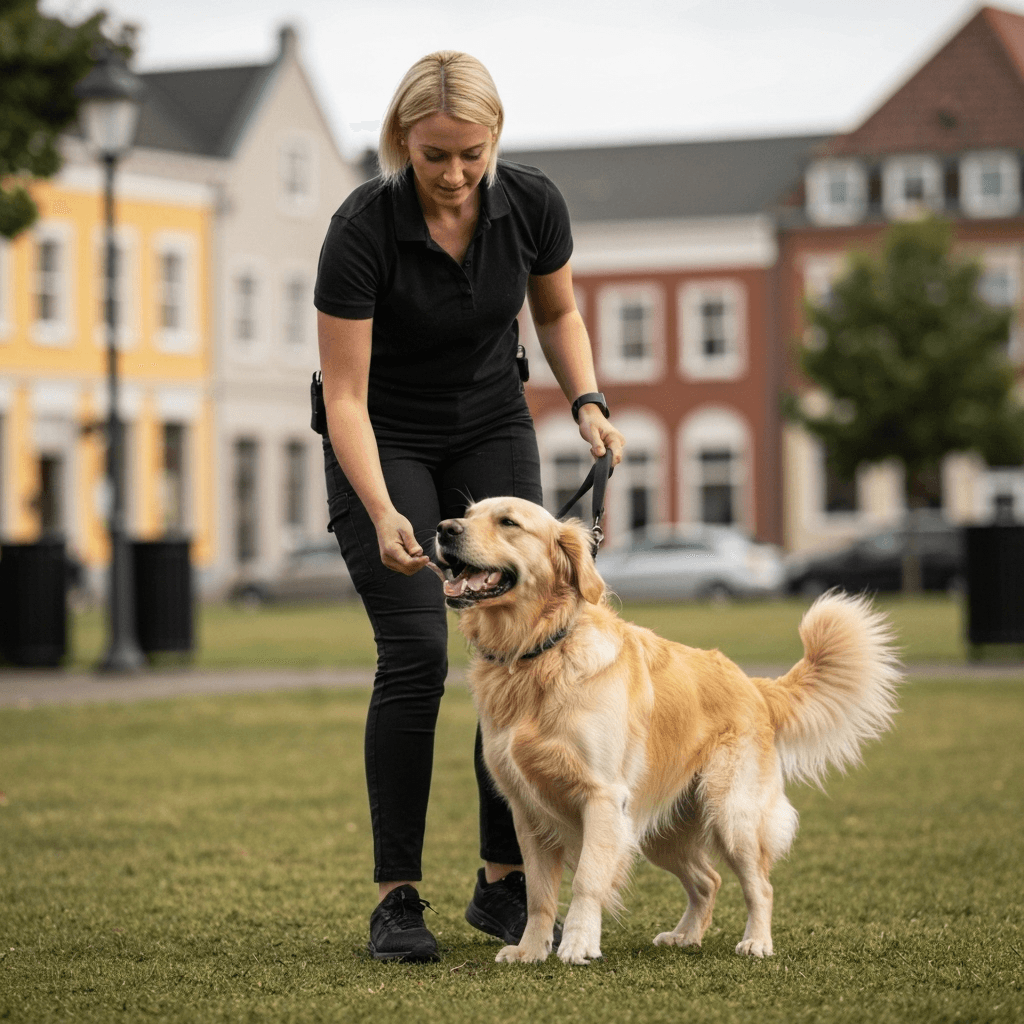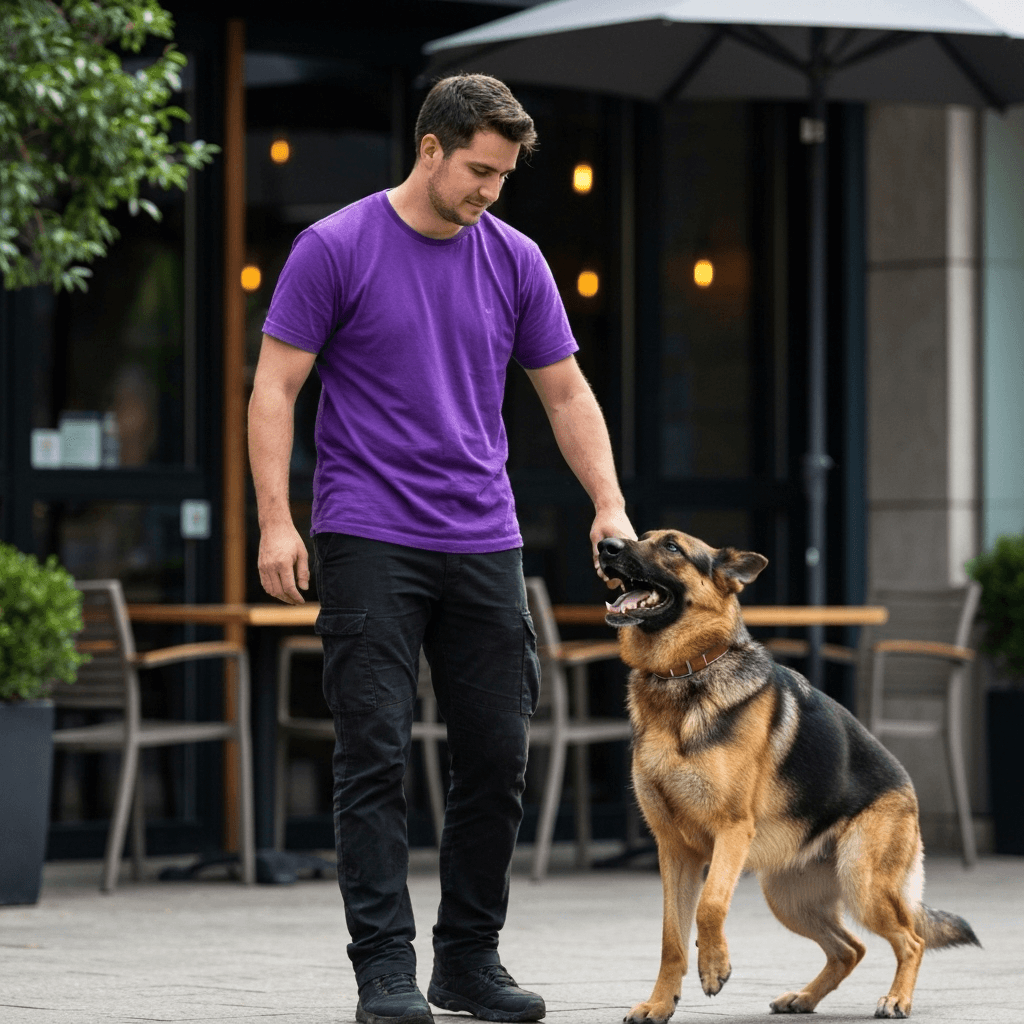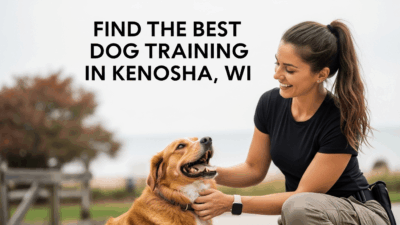Your Complete Guide to Choosing a Dog Trainer in Kenosha
Living in Kenosha means your dog needs to handle a lot of different situations. They’ll walk past the busy streetcar, stay calm during lakefront festivals, and greet other dogs politely at Petrifying Springs Park.
The right trainer understands what daily life looks like here. They know your dog needs to walk nicely on crowded sidewalks downtown and stay focused when kids are playing at Simmons Island.
How to Choose the Right Trainer
Start by thinking about where you actually spend time with your dog. Do you walk through the museum campus regularly? Does your dog need to behave during outdoor dining on 6th Avenue? A good trainer will help you practice in these real situations, not just in a training room.
Credentials matter because they show a trainer has learned proven methods and continues their education. Look for certifications like KPA-CTP and CPDT-KA, which focus on science-based training methods.
If your dog has serious behavioral issues like aggression or severe anxiety, you’ll want someone with specialized credentials. The IAABC-CDBC or CBCC-KA certifications show a trainer has advanced knowledge about behavior problems.
Think about your schedule too. Some trainers offer in-home sessions where they come to you, while others run group classes at set times. Day training programs let the trainer work with your dog during the day, then teach you what they learned.
Common Dog Training Methods Explained

Positive reinforcement is the gold standard for dog training today. Your dog learns by earning good things like treats, praise, or play when they make the right choice. This builds confidence and creates dogs who want to work with you.
Puppy classes focus on socialization during those critical early months. Your puppy learns that new people, sounds, and places are nothing to worry about. These classes also cover potty training, crate comfort, and basic leash training so your pup can handle trips to the farmers market or walks along the lakefront path.
Basic obedience gives you the everyday skills that make life easier. When your dog knows sit, down, stay, come, and how to walk on a loose leash, you can take them anywhere with confidence. These skills become the foundation for everything else.
Behavior modification is different from basic training. This is for dogs with specific problems like barking at other dogs, destroying things when left alone, or being afraid of loud noises. The trainer uses careful, gradual methods to help your dog feel differently about whatever is causing the problem.
Service dog training is highly specialized work that takes months or years. If you’re exploring this option, look for trainers who understand the legal requirements and can honestly assess whether your dog has the right temperament for this demanding job.
Average Cost of Dog Training in Kenosha (Updated for 2025)
Training costs in Kenosha depend on what type of help you need and how experienced your trainer is. Here’s what most people pay in 2025:
| Service Type | Average Cost (Kenosha/Kenosha County) | Notes |
|---|---|---|
| Puppy classes, 4–6 weeks | $150–$260 total | Small group puppy classes, early manners, socialization |
| Group obedience classes, 4–6 weeks | $160–$280 total | Foundation dog training classes with distractions |
| Private lessons, 60–75 min | $100–$170 per visit | Skill-building or targeted issues |
| In-home dog training packages, 4–6 visits | $420–$900 total | Custom plan for home and neighborhood |
| Day training, 2–4 sessions weekly | $450–$950 per week | Trainer works your dog plus owner handoffs |
| Behavior consult, initial | $140–$220 | Reactivity, fear, multi-dog issues |
| Board and train, 2–4 weeks | $2,100–$4,200 total | Ask for daily handling logs and transfer sessions |
| Service or therapy dog goal planning | $150–$300 initial | Suitability, task or therapy goals, roadmap |
Group classes usually cost less per session but move at a set pace. Private lessons cost more but let you focus on exactly what your dog needs. If you live further out in Kenosha County, expect to pay a travel fee for in-home visits.
Always ask what’s included in the price. Some trainers provide training tools, while others expect you to buy your own. Make sure you understand the cancellation policy before you commit.
Questions to Ask a Potential Dog Trainer
Before you hire someone to work with your dog, you need to know they’ll use methods that are safe and effective. Here are the most important questions:
- What training methods do you use, and how do you handle it when a dog gets frustrated or scared?
- What are your credentials, and do you take continuing education classes like CPDT-KSA?
- How will you help my dog with the specific places we go in Kenosha?
- Do you offer the type of training that fits my schedule and budget?
- How will we know if the training is working, especially when we move from easy situations to harder ones?
- What are the total costs, including any travel fees, and what’s your policy if I need to cancel?
- Do you carry liability insurance?
- If my dog has behavior problems, will you work with my veterinarian?
- For board and train programs, where will my dog stay and how will you teach me what they learned?
A good trainer will answer these questions directly and help you understand what to expect.
Local Kenosha Rules and Considerations
Kenosha has straightforward dog laws, but it’s important to follow them. Your dog must be on a leash in all public places except inside designated dog parks. The leash law applies everywhere – downtown sidewalks, park trails, and the lakefront area.
All dogs need current rabies vaccination and a city license. You can find information about pet licensing requirements at the City of Kenosha website.
Always clean up after your dog, whether you’re at a park, on a trail, or walking through your neighborhood. And if your dog is a barker, work on quiet training early. Neighbors can file noise complaints, and the city can issue fines for dogs that bark excessively.
Wisconsin doesn’t require dog trainers to have a state license, but good trainers still carry liability insurance and follow local business rules. For health information, Wisconsin’s Department of Health Services has guidance about rabies requirements.
Local Kenosha Resources for Dog Owners
Kenosha has two excellent fenced dog parks where your dog can play off-leash and you can practice recall training. Carlisle Family Dog Park at Petrifying Springs Park has separate areas for different sized dogs, which makes socialization safer and less overwhelming.
Harris Family Dog Park at Old Settlers Park also has multiple enclosures and plenty of space for training exercises. Both parks are great places to work on greeting other dogs politely and coming when called.
You can find current information about all the county’s dog facilities at Kenosha County Parks website. Rules and hours can change, so it’s worth checking before you make a special trip.

Common Questions
How much does in-home dog training cost?
Most trainers in the Kenosha area charge $100–$170 per session for private, in-home training. If your dog has complicated behavior problems, expect to pay toward the higher end of that range.
Is in-home dog training worth it?
Yes, especially if your dog’s problems happen at home. It’s much easier to work on door manners, jumping on guests, or barking at the mailman when you’re actually in your house. Plus, you can practice walking right from your own front door.
Can you pay someone to house train your dog?
Many trainers offer day training or intensive puppy programs that include potty training. But remember, you’ll still need to follow the schedule consistently when the trainer isn’t there.
What is the 3-3-3 rule for dog training?
This rule helps set realistic expectations for new dogs. Expect about 3 days for your dog to decompress from a big change, 3 weeks to start understanding your routine, and 3 months to feel completely settled. Don’t rush the process.
How long will it take to reach my training goals?
Most puppies and dogs without serious behavioral issues show good progress in 4–8 weeks with daily practice. Dogs with fear or aggression problems often need several months of careful behavior modification work.
What should I bring to group classes?
Bring a flat collar or harness (not a retractable leash), a 6-foot leash, small high-value treats, water for your dog, and vaccination records if the trainer requests them. Leave prong collars and shock collars at home unless specifically recommended.
What’s the leash law in Kenosha?
Dogs must be on leash in all public areas except inside designated off-leash dog parks. This includes the lakefront, all city parks, and downtown areas.
Do I need a dog license in Kenosha?
Yes, all dogs need to be licensed through the city. You’ll need to show proof of current rabies vaccination. Check the city website linked above for current fees and requirements.
What shots does my dog need in Wisconsin?
Rabies vaccination is required by state law, usually by 5 months of age. Your veterinarian will recommend other vaccines like distemper-parvo and bordetella based on your dog’s lifestyle and risk factors.
Are dog trainers required to be licensed in Wisconsin?
No, Wisconsin doesn’t license dog trainers. This is why checking credentials like KPA-CTP, CPDT-KA, or behavior-focused certifications like IAABC-CDBC is so important.
Where can I practice off-leash recall?
The fenced dog parks are your best option for off-leash practice. Go during quieter times when there are fewer distractions, and keep training sessions short and positive.
Which dog parks allow training around Kenosha?
Both Carlisle Family Dog Park and Harris Family Dog Park welcome training activities inside their fenced areas. Just be respectful of other users and follow posted rules.
What beaches and trails allow dogs?
Most park trails allow leashed dogs, but swimming beaches typically don’t allow pets. The lakefront promenade and trails at Petrifying Springs Park are good spots for leash training and socialization.
Do trainers need insurance to work in parks?
While not required by state law, most parks require commercial permits and liability insurance for business activities. Ask your trainer if they’re properly insured and permitted.
How do I evaluate a board and train program?
Ask detailed questions about daily schedules, training methods, veterinary care if needed, and how they’ll transfer the skills to you. Look for programs run by certified trainers like those with CTC credentials who can explain exactly what they’re doing and why.
The best training programs understand that every dog is different and every family has unique needs. When you find a trainer who uses positive methods, has good credentials, and really listens to what you’re dealing with, you’re on the right track. Your dog can learn to handle everything Kenosha has to offer, from busy summer festivals to quiet winter walks along the lake.
